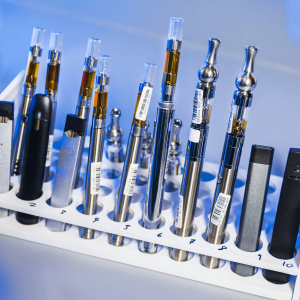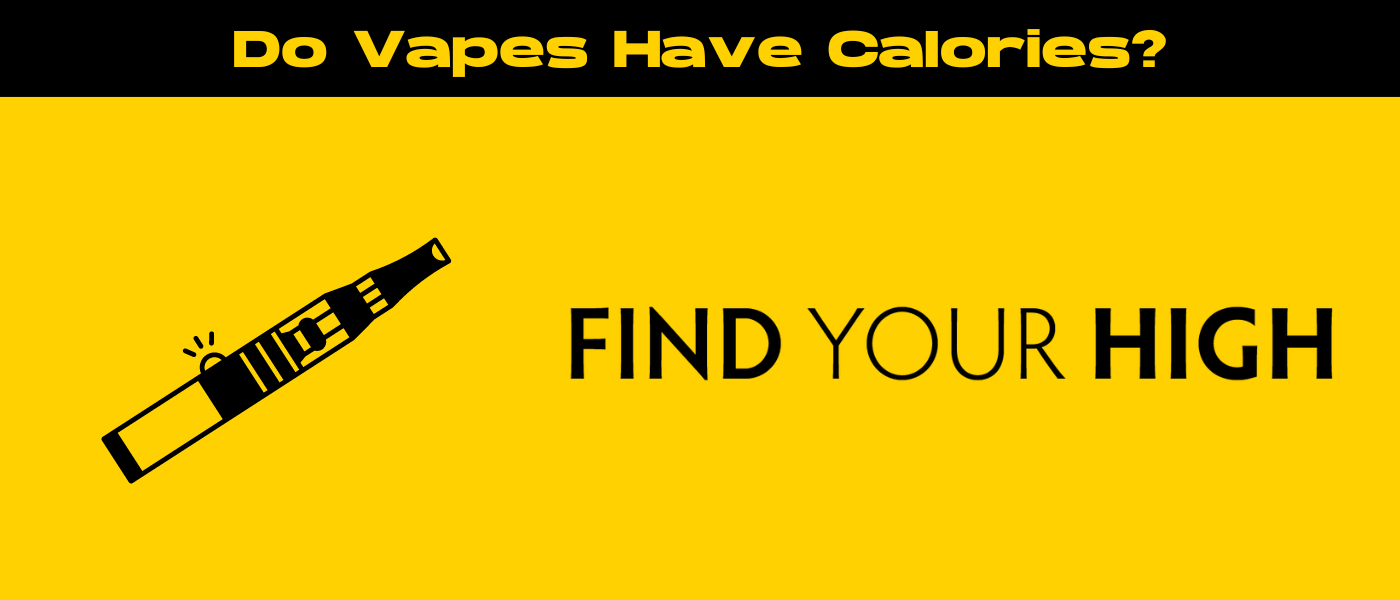You’ve probably noticed that vaping has taken the world by storm, and it’s not just for the cloud chasers — it’s becoming a lifestyle. But like any vice, we do consider how it effects our lifestyle, which leads us to wonder: Do vapes have calories?
When it comes to vaping, do we even need to bother with the calorie counter? In this blog, we’ll explore whether or not vapes require a calorie counter. Let’s begin!
What are Vapes?
Before we deep-dive into the calorie conundrum, let’s get the basics down.
Vapes, short for vaporizers, often act as an alternative to smoking traditional flower. These devices heat up a liquid, called vape juice, e-liquid, cannabis oil, or THC distillate, until it turns into a vapor that you inhale. No burning, no smoke, just vapor.
Understanding Calories
In simple terms, a calorie is a unit of energy. Our bodies need this energy to do everything – from running a marathon to binge-watching our favorite series. When we talk about calories in food, we’re talking about how much energy our body can get from consuming that food.
Calories are measured in a pretty straightforward way. Scientists burn the food in a lab and measure the heat it produces. This gives them the calorie content. But here’s the kicker – not all calories are created equal when it comes to your health. Our bodies process a cookie differently from a carrot, even if they have the same number of calories.
Now, when it comes to the substances we usually ingest, like food and drinks, caloric content can vary a lot. A slice of pizza? High on the calorie scale. A cucumber? Not so much. It’s about finding a balance that works for your health and your happiness.
The Composition of Cannabis Vape Juice
When we dive into the details of what’s in cannabis vape juice, we find a mixture typically containing propylene glycol (PG), vegetable glycerin (VG), flavors, and THC or CBD extract. PG and VG act as the backbone of vape juice, producing vapor and delivering vape juice flavors.
For those watching their calorie intake or hoping to lose weight, it’s worth noting PG and VG are organic compounds with calories – PG has about 4 calories per gram, while VG has slightly more at 4.32 calories per gram. However, the amount used in vape juice is minimal, so there’s no need to worry about it affecting your diet significantly.

Do Cannabis Vape Juices Contain Calories?
Alright, so we’ve established that the key components in vape juice could theoretically add some calories to your daily intake. But how does the body handle these?
The truth is, while we can say that vaping ingests some amount of these substances, the way our body processes them is not the same as ingesting food. Inhaling PG and VG means these compounds are absorbed differently, primarily through the lungs, and the metabolic pathways are not the same as those for calories that come from food.
This distinction is crucial because it means the caloric impact of vaping is minimal—a far cry from munching on a bag of chips. Plus, there’s no concrete evidence showing that these calories have any significant effect on your diet or weight.
Comparing Vape Caloric Intake to Traditional Foods and Beverages
Now that we have a handle on the calorie content in vape juice (not much to sweat about, right?), let’s put things into perspective by comparing it to the everyday foods and drinks we consume.
Imagine this: vaping is like catching a whiff of your neighbor’s BBQ – you’re not really eating, but you’re in the zone, sort of.
When you think about it, sipping on a single can of soda could set you back about 150 calories, which is way above anything vape juice brings to the table. On the flip side, vaping has very minimal calories, so there’s no need to pull out the calorie counter for every hit.
Now, we’re not saying to swap your snacks for a vape if you’re losing weight, but if you’re watching your calories, knowing the difference can make you breathe a bit easier. Vaping’s caloric intake is so tiny; it’s barely a blip on the radar compared to munching on a bag of chips or downing sugary drinks. It’s all about perspective and making choices that fit your lifestyle and goals.

The Health Implications of Vaping Calories
Alright, so jumping from calories to health might have you wondering if there’s more to the story when it comes to vaping and your well-being. There’s a bit of chatter out there about whether puffing on your vape could lead to weight gain or other health concerns. But, is there any truth to this?
First up, the big myth: vaping will make you gain weight. Here’s the deal – the calorie count in vape juice is so low that it’s pretty much a non-issue when it comes to packing on pounds. You’d probably have to be vaping non-stop to even get close to the caloric impact of a single cookie. And even then, our bodies don’t process these calories the same way as food, which means you likely won’t gain weight.
Research on vaping, caloric intake, and health is still in the early stages, but so far, there’s no concrete evidence to suggest vaping has any direct impact on your weight or overall calorie intake. Most studies focus on the other health effects of vaping, like its impact on lung health, rather than its negligible calorie content.
But here’s the kicker – just because the calorie content isn’t a concern doesn’t mean vaping is all sunshine and rainbows. It’s important to stay informed about all aspects of vaping, including potential health risks unrelated to calories. Like any lifestyle choice, it’s all about weighing the pros and cons and making decisions that fit with your health goals.

Conclusion
To sum everything up, we’ve discussed what is in vape juice, explained calories in a simple way, and compared the calorie content of vaping to snacking. Essentially, vape juice does have some calories, but the amount is so minimal that it’s not worth worrying about – especially when compared to the calories in the food and drinks we consume regularly.
In the bigger picture, the calories from vaping are negligible. It won’t impact your weight or health like a diet rich in sugary snacks or fast food could. However, this doesn’t mean vaping is a “health product,” There are many other factors to consider, including lung health and the risk of addiction.
More research is needed to fully understand how vaping affects our bodies. If you’re thinking about vaping or are already doing it and concerned about its impact on your health and diet, it’s important to keep up with current research and talk to health professionals for advice tailored to you.
In conclusion, the calories from vaping are minor. The key is to make informed choices and understand how vaping fits into your overall lifestyle and health objectives. Stay curious and well-informed, and you’ll make the right decisions for yourself.
Frequently Asked Questions
1. Can I gain weight from vaping?
Gaining weight from vaping is pretty unlikely. The calorie count in vape juice is super low. Plus, our bodies absorb calories from vapes differently than food calories, so puffing on a vape isn’t going to cause weight gain.
2. Can you get calories from vaping?
Technically, yes, since vape juice contains PG and VG, which have a tiny bit of calories. But we’re talking really small amounts here. It’s not something you’d need to factor into your daily calorie count.
3. Does Elf Bar have calories?
Yep, Elf Bar, like other vapes, contains PG and VG, so there are a few calories in there. But again, it’s such a minimal amount that it’s hardly worth noting how many calories are actually in the product.
4. Is vaping okay for weight loss?
Well, vaping isn’t a weight loss product, so it’s not something you should rely on to lose weight. While it’s true that vaping comes with fewer calories than snacking, the best route for weight loss is the classic combo of a balanced diet and regular exercise.
5. Does your body absorb calories in vape juice?
The simple answer is yes, technically, your body does absorb calories from the propylene glycol (PG) and vegetable glycerin (VG) found in vape juice. However, the amounts are so small that it’s not worth bothering to adjust your fitness app for it.
Scientists have found that our bodies process these calories differently than those from food. For example, licking a stamp introduces calories to your body through the glue, but it’s not going to impact your weight. Essentially, the calories from vaping are so insignificant to your overall daily intake that they’re comparable to forgetting to account for a piece of gum you chewed after lunch.

 Rewards
Rewards




